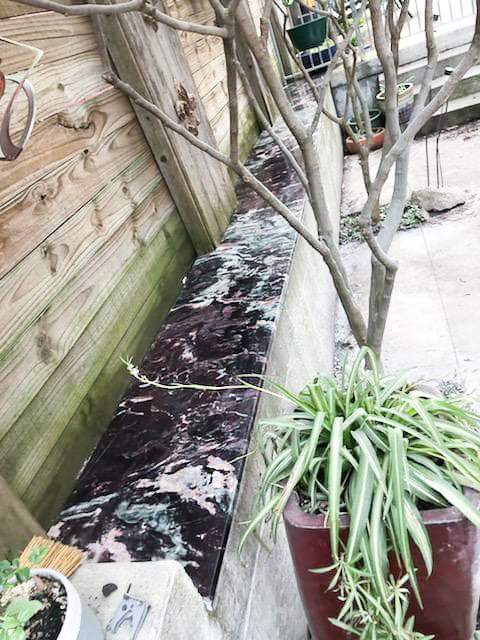
If you love hosting outdoor parties you probably already have an outdoor kitchen, or you’re thinking of installing one. The one thing that makes an outdoor kitchen successful is having plenty of outdoor kitchen countertops for preparing and serving food to your guests. You may want to add extra space for dining, or just some additional room to sit back and relax after a long day.
Consider durability first when choosing your outdoor kitchen countertop, then appearance second. It must be waterproof, durable, easy to clean, and look fantastic; and the great thing is that you have many materials to choose from. In fact, you have as many materials to choose from for an outdoor kitchen as you do for an indoor kitchen.
Concrete Countertops for your Outdoor Kitchen
Concrete countertops are very resilient, they’re easy to clean up, and they’re difficult to stain, which is why concrete is the ideal material for your outdoor kitchen countertop. To prevent staining, make sure your concrete countertop is finished with a sealant. It’s important that your concrete countertop is installed correctly because it will crack if not done properly. Unfortunately, concrete scratches and chips easier than granite, but in general it holds up pretty well. There are limitless design options with this type of countertop so it can be poured to fit your exact dimensions; it has a nice, smooth surface, and can be cast in any shape. Concrete can be stained in almost any color; however, sunlight can cause some colors to yellow and fade over time – simply go for natural earth tone colors and you shouldn’t have this problem.
Granite Countertops for your Outdoor Kitchen
Granite countertops for outdoor kitchen-use tie in the relationship between the interior and exterior of your home, bringing indoor comforts and luxuries to the backyard – especially if you choose the same granite as your indoor kitchen. Granite is heat-resistant, easy to clean, looks luxurious, and it’s almost seamless. Granite has become homeowners favourite material because there are so many colors and finishes to select from. As a natural stone, granite is both beautiful and durable, and it can’t be damaged by heat. When sealed, granite is also resistant to mold, stains, and mildew. Granite won’t fade when exposed to sunlight, but we do suggest you select a lighter color if there’s no shade over your outdoor kitchen because darker colors can become hot to the touch.
Quartzite Countertops for your Outdoor Kitchen
Essentially, quartzite has the same qualities as granite, which makes quartzite countertops for outdoor kitchen design a great choice. Your countertop will be strong and durable and will last a long time. Note that we’re referring to the natural stone quartzite, not the engineered stone known as quartz. Quartzite has many of granite’s good qualities and looks very much like marble, but it’s a lot easier to care for. Cleaning is easy; just use soap and water, and make sure you clean as you go to avoid staining. And, of course, you should always use a cutting board. Try to seal your quartzite benchtop at least once a year and it will last for many years to come.
Tile Countertops
Tile countertops in outdoor kitchens can be installed in warmer climates, but exposure to the cold may cause the grout to crack. Granite and porcelain tiles are quite resistant to fading, but ceramic tile is prone to fading. We suggest you use a darker grout if you’re going with a tile countertop in your outdoor area because the grout can stain. Also consider using larger tiles as this will reduce the amount of grout required. Some homeowners find using tile an attractive option because they’re cheaper than a full slab, plus there are a wide range of stone tiles to choose from – like porcelain, granite, marble, slate, and so many more.
Before making your final decision, consider how the tile you choose will hold up in your climate. Also consider the right color for you when choosing your outdoor countertop; darker colored surfaces retain more heat than light-colored surfaces, which means that a dark-colored surface could be very hot to the touch after lengthy exposure to sunlight.
Quartz Countertops
We suggest you do not choose quartz for your outdoor kitchen countertop. The reason is that the resin used in the manufacturing process turns yellow when exposed to weather, especially sunlight. We also suggest you stay away from materials like Corian because it’s not manufactured to resist fading when exposed to UV rays.







